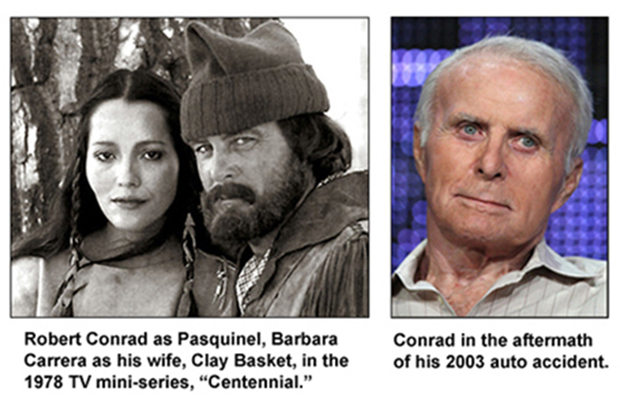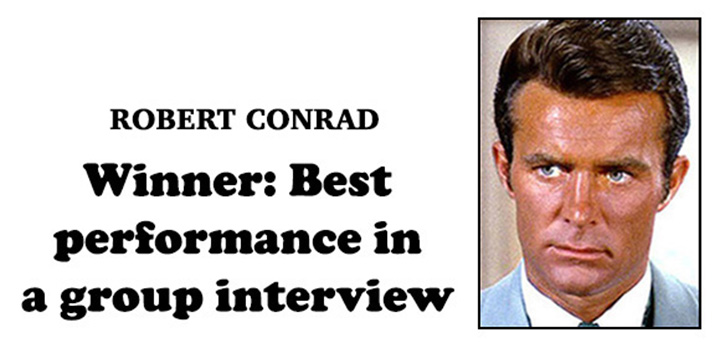| HOME |
 |
|
|
Few actors were so full of themselves in an interview as was Robert Conrad, best remembered for "The Wild, Wild West" and later "Baa Baa Black Sheep." He also did a memorable series of commercials that showed him with an Eveready battery on his shoulder as he dared anyone to knock it off. Being cocky was his stock in trade. And while this could put off several people, it made for a good interview. Conrad would prove that he was more than a pretty face with a pugnacious attitude when he played Pasquinel, the fur trader, in "Centennial," more than holding his own in a large cast of talented actors that included Raymond Burr, Richard Chamberlain, Sally Kellerman, Lynn Redgrave, Timothy Dalton and Richard Crenna. In 2003 Conrad was severely injured when he drove head-on into another vehicle. His right arm was paralyzed and he was convicted of driving under the influence. While retired from acting, Conrad has for the past five years been host of “The PM Show with Robert Conrad” on CRN Digital Talk Radio. Back in the 1960s I had two interviews with Conrad. The first interview (below) was conducted over the phone to promote "The Wild, Wild West." The show would debut about a month later, and would prove to be a hit. |
|
|
|
Two years later Conrad went to his hometown, Chicago, with stars of other CBS television shows to drum up publicity for the 1967-68 season. This was done through a series of group interviews – press conferences, if you will. These are the worst kinds of interviews because each reporter from the various newspapers, magazines, radio and television stations often has a separate agenda. In this kind of setting, it's not unusual for an actor to say something intriguing (" ... so there I was, just out of the Army, looking for work, living in a cardboard box in an alley, so close to starving that I had made up my mind to rob a bank ... ") only to be interrupted by an over-anxious reporter who asks, "Have you ever been to Sheboygan?" Conrad handled his question-and-answer session perfectly. It probably helped that he loves to talk. In that way he's a bit like George Maharis, who never heard a question he couldn't answer. Both speak with apparent candor and neither is shy when it comes to praising themselves. However, Conrad, at least, occasionally did so with a wink in this 1967 session: |
|
|
|
 |
|
Conrad wasn't kidding about doing his own stunt. He's now in the Hollywood Stuntman's Hall of Fame. Neither was he kidding about his boxing. Only five-feet-seven, he should have been a welterweight, but with his claim that 167 was his his fighting weight, that would make him a middleweight on the cusp of light-heavyweight status. He went through with that Los Angeles fight and won. Which doesn't necessarily mean anything ... because I have no idea who fought him. Not surprisingly Conrad was involved with at least one of the "Battle of the Network Stars" competitions that ABC used to televise on weekend afternoons. Conrad captained the NBC team in 1976 when he was starring in "Baa Baa Black Sheep," the World War II series retitled "Black Sheep Squadron" when it was syndicated. Conrad's relay team was penalized in one event, giving victory to the ABC team captained by Gabe Kaplan, of "Welcome Back, Kotter." Conrad disagreed with the decision and somehow talked Kaplan and the event's officials into settling the matter in a two-man, 100-yard dash. Conrad jumped out to a short lead, but Kaplan overtook him and won by a large margin. Also, Conrad did have a chance to act in the 1978 mini-series, "Centennial," and delivered a marvelous performance Conrad died in 2020. He was 84. |
|
| Robert Conrad on the Internet Movie Database (IMDb.com) | |
| HOME • STARSTRUCK • CONTACT |
